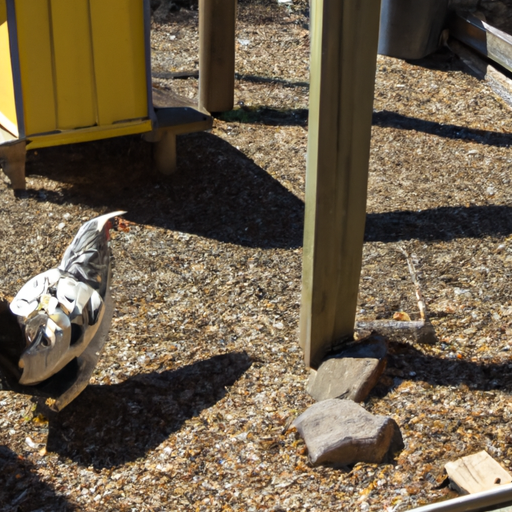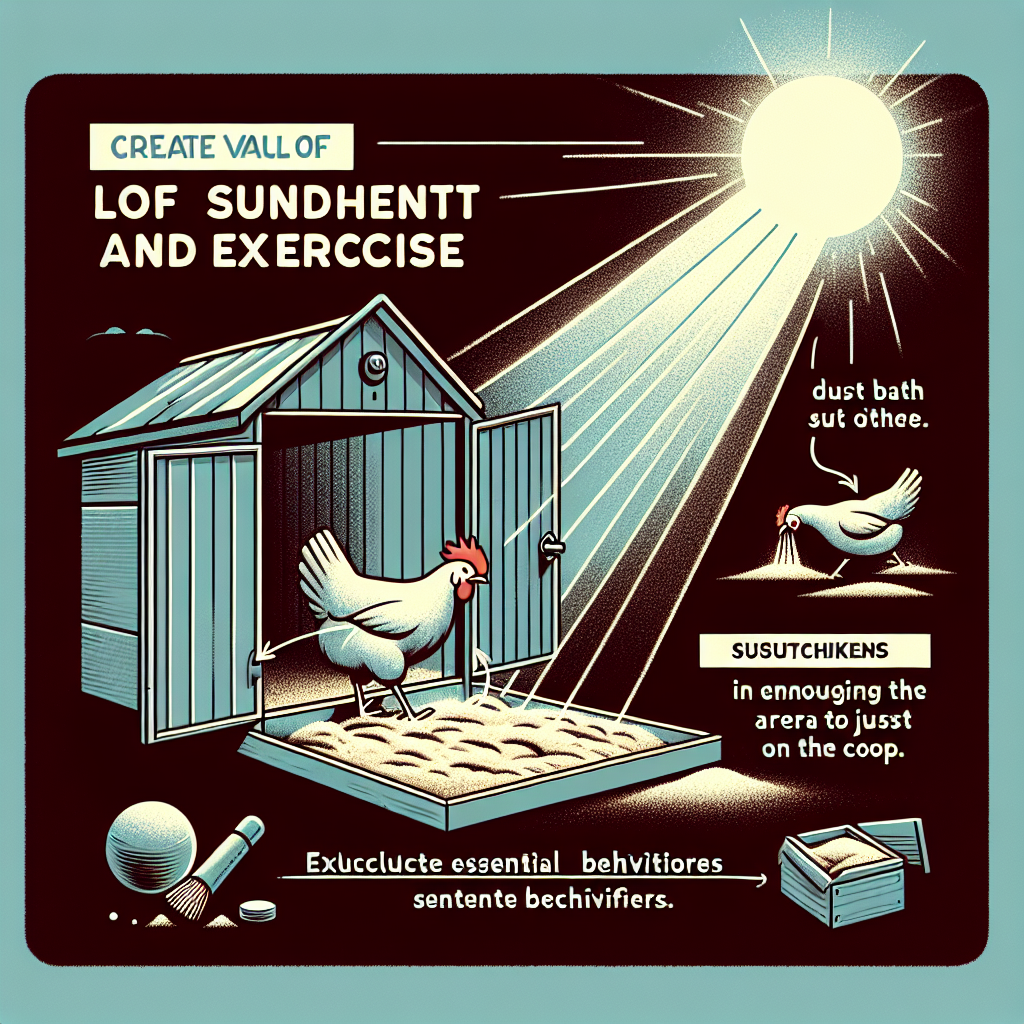Are you a proud chicken owner looking to create the perfect home for your feathered friends? Look no further! This article will guide you on how to provide a safe and stimulating environment for your chickens. From secure housing to enriching activities, you’ll discover practical tips to ensure your chickens are happy, healthy, and thriving. So get ready to create a paradise for your feathery companions!
Housing and Shelter
Provide adequate space
When it comes to housing your chickens, providing adequate space is crucial. Chickens need enough room to move around freely and engage in natural behaviors such as scratching and dust bathing. A good rule of thumb is to allow at least 4 square feet of indoor space per chicken. Additionally, make sure there is enough space for perches, nests, and feeding areas.
Choose the right type of coop
Selecting the right type of coop is essential for the well-being of your chickens. Coops should be sturdy, predator-proof, and well-ventilated. You can choose between stationary coops and portable ones depending on your needs. Stationary coops provide a more permanent solution, while portable coops allow you to easily move your chickens to fresh grazing areas.
Ensure proper ventilation
Proper ventilation is crucial for maintaining a healthy environment in the chicken coop. Good ventilation helps prevent the buildup of harmful gases and moisture that can lead to diseases. Make sure your coop has vents or windows that can be opened to allow fresh air to circulate. It is also important to ensure that there is no overcrowding in the coop, as this can hinder proper ventilation.
Ensure protection from predators
Predators pose a significant threat to chickens, so it is important to take steps to protect your flock. Fortify the coop and run with sturdy wire mesh to keep out predators such as raccoons, foxes, and opossums. Install predator-proof fencing around the perimeter of the coop to prevent digging or climbing. You can also consider using motion-activated lights or alarms to deter predators. Supervising your chickens when they are free-ranging can also help keep them safe from predators.
Bedding and Nesting
Use appropriate bedding material
Choosing the right bedding material is essential for maintaining a clean and comfortable environment in the coop. Some popular bedding options include straw, wood shavings, and shredded paper. Avoid using materials that can become damp and moldy, as this can lead to respiratory issues for your chickens. Regularly replace bedding to keep it fresh and dry.
Maintain cleanliness in the coop
Keeping the coop clean is essential for the health of your chickens. Regularly remove soiled bedding and droppings from the coop to prevent the buildup of harmful bacteria. This will also help control pests such as flies and mites. Make sure to wear gloves and a mask when cleaning the coop to protect yourself from potential health hazards.
Provide comfortable nests for laying eggs
Chickens need comfortable nests for laying their eggs. Provide nesting boxes lined with clean and soft bedding material such as straw or wood shavings. Each nesting box should be large enough for a chicken to comfortably sit and lay her eggs. Place the nesting boxes in a quiet area of the coop to provide privacy and reduce stress for your hens.
Food and Water
Provide a balanced diet
A balanced diet is essential for the overall health and well-being of your chickens. Feed them a high-quality commercial chicken feed that is specifically formulated to meet their nutritional needs. Additionally, offer them a variety of fresh fruits, vegetables, and kitchen scraps as treats. Avoid feeding them foods that are toxic to chickens, such as chocolate, onions, and avocado. Consult with a poultry nutritionist or veterinarian to determine the best diet for your flock.
Ensure constant access to fresh water
Chickens need access to clean and fresh water at all times. Place waterers in a location that is easily accessible to all chickens and ensure they are filled with clean water daily. Regularly check the waterers for debris or algae growth and clean them as needed. During extreme weather conditions, make sure the water does not freeze or become too hot by providing appropriate heating or cooling solutions.
Use appropriate feeders and waterers
Using the right feeders and waterers can help minimize wastage and keep the feed and water clean. Choose feeders and waterers that are suitable for your flock size and minimize spillage. Hang feeders at an appropriate height to prevent food contamination and discourage rodents or wild birds from accessing the feed.
Avoid overcrowding at feeding areas
Overcrowding at feeding areas can lead to stress, aggression, and poor nutrition in chickens. Make sure there are enough feeding areas for all chickens to access food without competition. Provide enough space for each chicken to eat comfortably, and consider using multiple feeding stations to ensure all chickens have equal access to feed.
Exercise and Enrichment
Allow free-ranging
Allowing your chickens to free-range is a great way to provide them with exercise and mental stimulation. Free-ranging allows chickens to explore their environment, forage for insects and plants, and engage in natural behaviors. Ensure that the area where your chickens free-range is secure from predators and has appropriate fencing to prevent them from wandering too far.
Provide ample space for scratching and dust bathing
Chickens love to scratch and dust bathe, so it is important to provide them with ample space to engage in these behaviors. Create a designated area in the coop or run where chickens can scratch at the ground and take dust baths. Optimal materials for dust bathing include dry soil, sand, or wood ash. Dust bathing helps chickens keep their feathers clean and control pests.
Offer toys and objects for pecking and exploring
Providing toys and objects for your chickens to peck and explore can help keep them mentally stimulated. Hang treat-filled piñatas or vegetable kabobs for them to peck at, or scatter food puzzles around their environment for them to discover. Change the location or type of toys regularly to prevent boredom and encourage natural foraging behaviors.
Health and Hygiene
Practice regular health checks
Regularly inspecting your chickens for signs of illness or injury can help identify and address health issues early. Check their feathers, eyes, beaks, combs, and feet for any abnormalities. Monitor their behavior, appetite, and droppings as well. If you notice any signs of illness or distress, consult with a veterinarian experienced in poultry health.
Maintain hygiene in the coop
Keeping the coop clean and hygienic is essential for preventing diseases and pests. Regularly remove soiled bedding, droppings, and uneaten food from the coop. Disinfect the coop periodically using poultry-safe products and ensure it is well-ventilated to minimize odors and moisture. This will help create a healthy environment for your chickens.
Prevent and treat parasites and diseases
Parasites such as mites, lice, and worms can cause significant harm to your chickens. Implement a regular parasite prevention and treatment program recommended by a veterinarian. This may include regular deworming, using mite and lice treatments, and following appropriate biosecurity measures to prevent the introduction of diseases to your flock.
Administer vaccinations if necessary
Vaccinations can be an important tool in preventing common poultry diseases. Consult with a veterinarian to determine if vaccinations are recommended for your flock, based on factors such as your location and the specific diseases prevalent in your area. Administer vaccinations according to the recommended schedule to help protect your chickens from harmful diseases.
Social Interaction
Keep a suitable flock size
Maintaining an appropriate flock size is essential for social interaction among chickens. Chickens are social animals and thrive when they have companionship. However, overcrowding can lead to aggression and stress. Provide enough space to avoid overcrowding and ensure each chicken has ample access to resources such as food, water, and nesting areas.
Introduce new chickens properly
When introducing new chickens to an existing flock, it is important to do so gradually and carefully. Isolate new chickens in a separate area adjacent to the main coop for a period of time to allow them to become familiarized with each other’s presence. This lessens the chances of aggressive behavior when they are eventually integrated into the flock.
Observe and address aggressive behavior
Chickens can display aggressive behavior, especially during times of stress or when establishing a new pecking order. While some pecking and squabbling is normal, continuous or excessively aggressive behavior should be addressed. Provide enough space and resources to minimize competition, and separate aggressive chickens if necessary to maintain the safety and well-being of all flock members.
Provide roosting bars for socializing
Roosting bars provide chickens with a place to perch and socialize. Ensure that roosting bars are properly sized and sturdy enough to support the weight of all chickens in the flock. Providing multiple roosting bars at different heights can give chickens options for perching, which can help reduce aggression and promote socialization.
Lighting and Temperature
Ensure appropriate lighting conditions
Proper lighting is crucial for the health and well-being of your chickens. Chickens require a balance of light and darkness to maintain natural biological processes. Provide at least 14-16 hours of light per day to stimulate egg production and ensure adequate exposure to natural sunlight. Supplemental lighting can be used during the winter months to prevent a decrease in egg production.
Maintain a comfortable temperature
Chickens are sensitive to extreme temperatures, so it is important to maintain a comfortable environment in the coop. Keep the coop well-insulated to retain heat during the winter and provide suitable ventilation to prevent overheating during the summer. Monitor the temperature regularly and make adjustments as needed to ensure your chickens are not exposed to temperature extremes.
Use heat lamps or heaters in cold weather
During colder months, provide additional heat sources in the coop to keep your chickens warm. Heat lamps or heaters can be used, but it is essential to use them safely to prevent fire hazards. Ensure that heat sources are hung securely and away from flammable materials. Provide enough heat to keep the coop above freezing temperatures but avoid overheating, as this can cause respiratory issues.
Predator Protection
Fortify the coop and run
Securing the coop and run is essential for protecting your chickens from predators. Ensure that the coop is made of sturdy materials such as solid wood or heavy-gauge wire mesh. Cover windows and vents with predator-proof wire to prevent entry. Reinforce any weak points or holes in the perimeter fencing to avoid predator access.
Install predator-proof fencing
A solid and secure perimeter fence is important in keeping predators out and chickens safe. Dig the fence into the ground to prevent predators from digging underneath. Use a fence with small gaps or attach predator-proof wire mesh to an existing fence to prevent predators from squeezing through or reaching in.
Use motion-activated lights or alarms
Motion-activated lights or alarms can help deter predators by startling them and drawing attention to their presence. Install them around the coop and run area to alert you and scare away potential threats. These devices can be effective in preventing nocturnal predators from approaching the vicinity of your chickens.
Supervise free-ranging
If you allow your chickens to free-range, it is essential to supervise them to ensure their safety. Keep an eye on them and be alert for signs of predators in the area. Consider using temporary electric fencing or netting to create a secure boundary for free-ranging chickens, providing them with a safe space to explore while still protecting them from predators.
Grooming and Maintenance
Regularly trim beaks and nails
Regularly trimming beaks and nails not only helps prevent overgrowth but also reduces the risk of injury or painful conditions. Use appropriate tools and techniques to trim the beak and nails, or consult with a veterinarian or experienced poultry keeper for guidance. Beak and nail maintenance should be done carefully and with caution to avoid causing stress or harm to your chickens.
Keep feathers clean and intact
Clean and intact feathers are essential for maintaining the health and insulation of your chickens. Provide dust bathing areas and ensure chickens have access to clean, dry soil or suitable dust bath materials. Regularly inspect feathers for dirt, lice, mites, or signs of damage. If necessary, clean feathers or treat infestations according to the guidance of a veterinarian.
Inspect and clean the coop regularly
Regular inspection and cleaning of the coop are necessary to maintain a healthy environment for your chickens. Check for signs of damage, moisture, or pest infestations. Remove any debris, soiled bedding, or accumulated droppings. Disinfect the coop periodically following proper biosecurity measures to prevent the spread of diseases.
Repair any damages or weak points
Regularly inspect your coop and run for any damages or weak points that could compromise the safety of your chickens. Repair any holes or gaps in the fencing, seal cracks or crevices, and reinforce any areas that predators may be able to exploit. Regular maintenance and repairs help ensure the longevity and security of your chicken housing.
Managing Stress and Anxiety
Provide a calm and quiet environment
Chickens can be easily stressed by loud noises, sudden movements, or disturbances. Provide a calm and quiet environment for your chickens by minimizing noise and disruptions. Avoid slamming doors, loud machinery, or sudden loud noises in the vicinity of the coop. This will help create a peaceful atmosphere that promotes the well-being and productivity of your flock.
Minimize sudden loud noises
To minimize sudden loud noises, consider the proximity of your coop to noisy areas. Avoid placing the coop near roads, construction sites, or other sources of loud noise. Be mindful of noise levels when handling equipment or working near the coop, as loud noises can startle chickens and cause stress or other negative impacts on their health.
Avoid overcrowding
Overcrowding can lead to stress and aggression among chickens, which can negatively impact their overall well-being. Provide adequate space for each chicken, ensuring that there is enough room for them to move around comfortably and engage in natural behaviors. Avoid adding more chickens than your coop and run can accommodate in terms of space, resources, and social dynamics.
Avoid sudden changes in routine or environment
Chickens thrive on routine, and sudden changes can cause stress and anxiety. Try to maintain a consistent daily routine for feeding, cleaning, and other activities. When introducing any changes to their environment, such as introducing new chickens or making modifications to the coop, do so gradually to allow them to adjust and minimize stress.
By following these guidelines, you can provide a safe and stimulating environment for your chickens, ensuring their health, happiness, and overall well-being. Remember to regularly assess and adapt your management practices to meet the evolving needs of your flock. With proper care and attention, your chickens will thrive and provide you with years of enjoyment.




